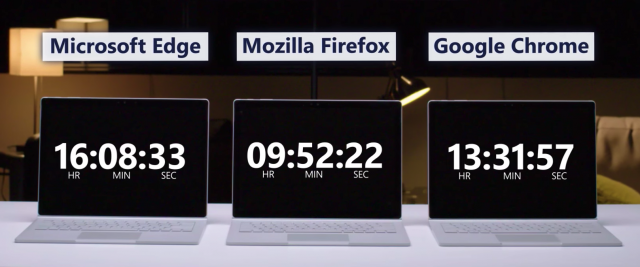Microsoft Edge bests Google Chrome in battery life and security tests

While Windows 10 is gaining some serious ground in the PC market, the same cannot be said about Microsoft Edge. Looking at the usage share of the major browsers on Windows 10, it is pretty much in the same place as it was a year ago -- a distant second to Google Chrome.
While it may be easy to dismiss Edge, Microsoft has rolled out major improvements since it debuted in mid-2015. And it's touting the benefits every chance it gets. Two new ads released by Microsoft promote better battery life and increased security over its main rival.
Microsoft has posted battery life benchmarks before, so it's no surprise to see it trying to woo laptop users again. In a video playback test conducted on Windows 10 Fall Creators Update running on three Surface Book devices, Edge bested Chrome and Firefox by a couple of hours.
The "identical" Surface Book devices stream the same video. Firefox is the first out of the race, after just over nine hours, 52 minutes and 22 seconds. Chrome follows it, with a runtime of 13 hours, 31 minutes and 57 seconds. Meanwhile, Edge kept the Surface Book going for 16 hours, eight minutes and 33 seconds.
While this sort of benchmark is likely to resonate well with many Windows 10 users on laptops, folks who use Windows 10 on desktops are unlikely to be impressed. After all, the improved energy efficiency that Edge offers is of little importance when you're always hooked up to the power grid.
How big of a difference laptop users are likely to see in real life is another matter. Surface Book is a high-end device that's probably very well optimized to run on battery power. The majority of Windows laptops may not be. Still, more battery life can only be counted as a major plus for Edge.
https://youtu.be/9NC_4m1oMIY
The other ad, which promotes Edge's security, claims that the browser blocks 18 percent more phishing sites than Chrome does. That's an interesting angle, though I suspect it is unlikely to appeal to a significant number of users. Depending on who you ask, you'll get a different leader here.
There is no source to back up this claim, but ZDNet suggests it may be an NSS Labs report which compared Edge on Windows 10 S to Chrome on Chrome OS. If so, it would not be the most scientific test, as the browsers were running on different platforms -- unlike the battery test above.
https://youtu.be/Hp33XWxRSYw
Microsoft Edge has come a long way, so it's only natural for Microsoft to want to promote it now. These sort of ads can play a big role in its uphill battle against Chrome, but only if Microsoft can reach enough users with them. After all, many Windows 10 users probably use Edge only to type "download Chrome" in the search box and download the setup file. Convincing them to give Edge a try may be the trick to turning the tide.
